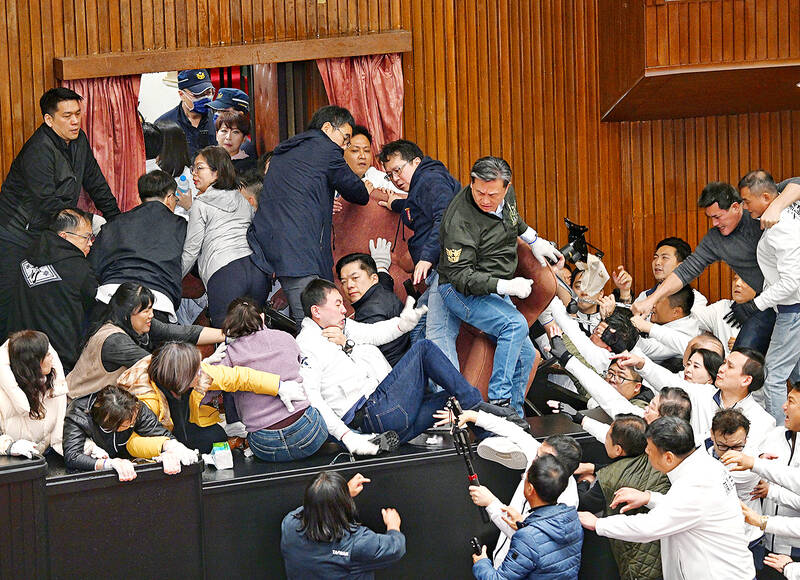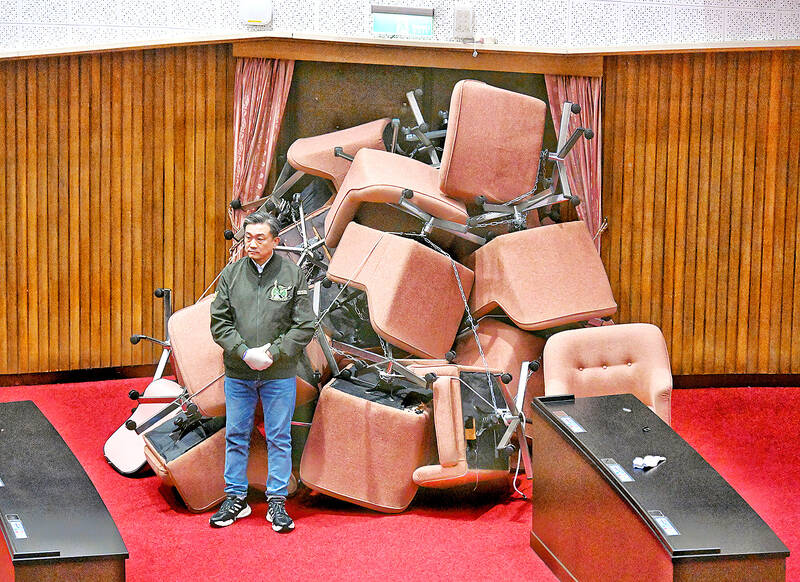This month Taiwan received a brutal Christmas present as the Chinese Nationalist Party (KMT) passed all three of its desired amendments, making recalls of elected officials more difficult, gutting the Constitutional Court and altering the budgetary allocations to local governments. The nation at present has no ultimate authority to determine the constitutionality of government actions, and the local governments, largely controlled by the KMT, have much greater funding. We are staring into an abyss of chaos.
The amendments to the Act Governing the Allocation of Government Revenues and Expenditures (財政收支劃分法), if they become law (as of this writing President William Lai (賴清德) has said he would promulgate them before the Jan. 2 deadline), would allocate 60 percent of available funding to local governments rather than the current 25 percent. According to the Directorate-General of Budgeting Accounting and Statistics (DGBAS) this would reduce central government spending by NT$375.3 billion (US$11.48 billion). The DGBAS also said the government would lose nine percent of its total revenue as a result of the amendments.
To put that figure in perspective, the defense budget for this year is currently set at NT$647 billion (US$20.24 billion), or 2.45 percent of GDP, while the budget as a whole is roughly US$90 billion. The resulting budget cuts would also reduce funding for health programs, such as cancer screening, that save government funds by catching problems earlier. Recall that the government has committed to massive investments in renewables over the next five years, and to social programs to support birth rates. Of course, government spending helps drive economic growth. These amendments are thus a vicious attack on the nation’s future.

Photo: Fang Pin-chao, Taipei Times
TAIWAN’S TAXES TOO LOW
The omitted variable in this debate is of course the nation’s pitiful tax take. According to an Organization for Economic Co-operation and Development (OECD) report this year, in 2022, the average tax-to-GDP ratio in 36 Asian and Pacific economies reviewed was 19.3 percent, below the OECD average of 21.5 percent. A CommonWealth Magazine piece from May of this year observed that Taiwan’s tax revenues as a percentage of GDP were just 19 percent, while its sales tax rate of five percent was the second lowest in the world, ahead of only tiny Andorra. It is telling that nobody in this debate has mentioned raising taxes — the refusal to tax Taiwan’s wildly undertaxed wealthy is the one value widely shared across the nation’s policymaking elites. This muted agreement is one reason the public has become so cynical about blue-green politics.
As I have noted before, land development and land speculation drive the domestic economy. These activities are the domain of Taiwan’s monied classes. In that ecosystem, low land taxes help drive high real estate asset prices. Academics Fu Chien-Hao (傅健豪) and Tseng Chung-Hsin (曾中信) analyzed Taiwan’s property tax system and found that it consistently undervalues real estate, a phenomenon that scales with property value: the gap between market value and assessed (tax) value is greatest for high value properties. The land tax is thus “severely regressive.” That is why the wealthy put their money into real estate.

Photo: Liao Chen-huei, Taipei Times
The same is true of other revenue systems. In another paper, Fu and Joseph Teyu Chou (周德宇) observe that the 2016 tax reform “helped reduce many tax-filing families’ tax liabilities, most tax benefits generated from the expansion of exemptions and deductions would likely be enjoyed by families with higher incomes.” The recent revisions to the land tax act have had similar effects.
The KMT’s amendments to the budgetary allocation represent the first time in 25 years that local governments have received more from the government budget than the central government. This is no coincidence. It suggests that what the pro-China parties seek is a return to the 1980s and 1990s, when local factions dominated local politics, and the government was for sale (nostalgia for authoritarianism of the Chiang Ching-kuo (蔣經國) era is little more than masked mourning for this period of local faction impunity). Those were the days when Chu An-hsiung (朱安雄) bought the Kaohsiung city council speaker election by bribing almost the entire city council — their confessions were elicited in exchange for the government foregoing indictments against them — and used his influence in Kaohsiung to get his wife a seat in the legislature and build his steel firm into the third-largest in Taiwan. Vote-buying and bribery were widespread.
LOCAL FACTION POWER GRAB

Photo: Fang Pin-chao, Taipei Times
How is this relevant? Many of us longtime Taiwan watchers think the KMT is slowly being hollowed out by powerful local factions. The authoritarian-era KMT did not permit local factions to operate at the regional or national level, fearing their competition, but it no longer has that kind of power. This shift of government budget funds to local governments help supercharge this trend as local politicians use the funds to feed and water their local patronage networks.
Local governments and the KMT-dominated legislature will likely look for ways to implement parts of the now-dead, cross-strait services pact, or perhaps explore former president Ma Ying-jeou’s (馬英九) insidious People’s Republic of China (PRC)-focused free enterprise zones. After all, there is no Constitutional Court to stop them.
Even as I write, the giant Matsu statue envisioned by former KMT Taichung mayor Jason Hu (胡志強) as a Mecca for Matsu worshippers and a gateway for PRC influence in Taiwan is under construction outside Taichung port.
It will also help ensconce and expand KMT power at the local level. It is obvious what will happen then: local legislators will vote for another round of weakening central government institutions. The PRC will then be able to gain influence in Taiwan via these governments. Naturally, a KMT-dominated legislature will make no changes to the current land tax system, which helps underpin its power at the local level and its influence among the wealthy. This will only create further links between the wealthy land holders and the PRC.
DEFENSE BUDGET
These budgetary changes are also aimed at another target: the US. US commentators frequently call for Taiwan to raise its defense budget to at least five percent of GDP. The corollary of this position is that if Taiwan does not raise its defense spending, the US will be justified in abandoning Taiwan.
Taiwan’s GDP last year was roughly NT$23.5 trillion (US$755 billion). Five percent of that is just under NT$1.2 trillion (US$36.6 billion). As DPP legislator Puma Shen (沈伯洋) observed in a livestream last week, the defense budget is the single largest item and the most easily adjusted portion of the government budget. It will likely take the largest hit.
The “abandon Taiwan” cacophony will now grow stronger. As intended.
Notes from Central Taiwan is a column written by long-term resident Michael Turton, who provides incisive commentary informed by three decades of living in and writing about his adoptive country. The views expressed here are his own.

Climate change, political headwinds and diverging market dynamics around the world have pushed coffee prices to fresh records, jacking up the cost of your everyday brew or a barista’s signature macchiato. While the current hot streak may calm down in the coming months, experts and industry insiders expect volatility will remain the watchword, giving little visibility for producers — two-thirds of whom farm parcels of less than one hectare. METEORIC RISE The price of arabica beans listed in New York surged by 90 percent last year, smashing on Dec. 10 a record dating from 1977 — US$3.48 per pound. Robusta prices have

The resignation of Taiwan People’s Party (TPP) co-founder Ko Wen-je (柯文哲) as party chair on Jan. 1 has led to an interesting battle between two leading party figures, Huang Kuo-chang (黃國昌) and Tsai Pi-ru (蔡壁如). For years the party has been a one-man show, but with Ko being held incommunicado while on trial for corruption, the new chair’s leadership could be make or break for the young party. Not only are the two very different in style, their backgrounds are very different. Tsai is a co-founder of the TPP and has been with Ko from the very beginning. Huang has

A few years ago, getting a visa to visit China was a “ball ache,” says Kate Murray. The Australian was going for a four-day trade show, but the visa required a formal invitation from the organizers and what felt like “a thousand forms.” “They wanted so many details about your life and personal life,” she tells the Guardian. “The paperwork was bonkers.” But were she to go back again now, Murray could just jump on the plane. Australians are among citizens of almost 40 countries for which China now waives visas for business, tourism or family visits for up to four weeks. It’s

Beyonce on Sunday finally won the Grammy for the year’s best album for her culture-shaking Cowboy Carter, as rapper Kendrick Lamar posted a clean sweep on a night that served as a love letter to fire-ravaged Los Angeles. Chappell Roan, Charli XCX, Doechii and Sabrina Carpenter emerged as big winners at the performance-heavy gala, while heavyweights Taylor Swift and Billie Eilish went home empty-handed. Beyonce’s win for Cowboy Carter now makes her the most nominated, most decorated artist at the awards show ever — as well as the first Black woman to claim the top prize in this century. The triumph was all